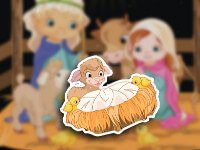The Unlucky Merchant
Tap the calamus image below to get free access to our best collection of stories for children with related activities. Download it to enjoy our stories whenever you want
Advertisement
![]() Where to start? Download our free Workbook of Values, watch our animated stories and enjoy Jakhu Stories, our stories for kids app
Where to start? Download our free Workbook of Values, watch our animated stories and enjoy Jakhu Stories, our stories for kids app
Values
- Generosity
Main Lesson
The best way to have good luck is to share all the good things you have. Grateful friends are the foundation of your good fortuneSetting
A long time ago, near a villageCharacters
A merchant, a traveler, and two magic glass jarsBelow you'll find the story text and a link to download it. Use it to improve the emotional and cognitive development of your children or your baby and enhance your parenting skills
Story
There was once a merchant who, after years of bad business, was cursing his bad luck.
A traveller was passing by, and he asked the merchant what was troubling him. Hearing that the merchant was a man of great ill fortune, the traveller opened his knapsack and pulled out a strange-looking device made from two crystal glasses stuck together. They were decorated with strange drawings. One glass was green, and the other red, and inside each glass were some strange seeds, each the same colour as their glass.
"Well, you've just run into some good luck, meeting me," said the traveller. "This is exactly what you need: two little pots of luck."
The merchant was somewhat surprised, but the traveller explained to him that these seeds were seeds of luck. The green seeds brought good luck, and the red seeds brought bad luck. The two glasses were joined, and when one filled up, it caused multiple incidents of good or bad luck, according to which type of seed was overflowing the glass.
The merchant, thrilled, thanked him for the gift, and hardly managed to hear the traveller’s last words, warning the merchant how difficult it was to use the glasses effectively. Expectantly, he carefully examined the green seeds; the lucky ones. Though he wasn't familiar with them, he was sure he could find someone that could sell him several new containers, and so he covered the top of the vessel with great care, being sure not to drop it.
Then he looked at the red seeds, and thought that the best way to avoid them filling the glass would be to empty them out, right there. So that's what he did, and off he went, continuing his journey. A little later, he met a woman who, seeing his seed jars, must have recognised them. She ran up to him and asked him for a good handful of seeds. The merchant roundly refused, and the woman left, cursing him under her breath.
"What do they want me to do?" he thought, sadly, "I can't just throw away my good luck."
He continued on his way, and had many other similar encounters.
As time went on, the merchant saw that only the red jar was filling up. It seemed more or less logical, because otherwise the jars wouldn't have much power. He just stopped every now and then to empty the red seeds out.
However, the red jar was filling up faster and faster, and it reached a point where he could hardly empty it before it had filled up again. Finally it started overflowing.
"Well, that's gone and done it," thought the merchant, "all I need now is another pile of bad luck."
He looked all the way back down the road, and saw that the seeds he had emptied out, had grown into great big weeds which had choked to death all the other plants in the area. When the local villagers saw this, they were furious, and set about finding who had caused the destruction of their crops. The merchant almost escaped suspicion, but the woman who he had refused to give seeds to betrayed him, and he had to run from that village through a hail of kicks and punches.
And that was only the start of the series of ill fortune the merchant had to suffer. Without doubt, those seeds were extremely powerful, and all that power had backfired against him. In just three days he tried a hundred times to get rid of those jars, but it would never stop his run of bad luck. Instead, he had to find some way to fill up the green jar, and not spill any more red seeds. So he removed the lid of the green jar, to find, to his horror, that most of the green seeds had disappeared...
While he was lamenting his poor luck, he took a moment to examine the pictures on the jars. They seemed to be instructions. In the pictures the red jar was always closed, and the green one always open. It seemed that anyone could take as many green seeds as they liked. He decided to continue his journey in that manner. Soon he met a man who asked him for some seeds, and the merchant told the man to help himself. Immediately after this his luck began to change. The villagers, who had been chasing the merchant weren't far off now, but his new friend - who he had given the seeds to - came to the rescue by pointing them in the wrong direction.
Similar things occurred with many others he met on the road. The merchant realised that if, instead of throwing them away, he gave the seeds as a gift to others, then the green jar was the one that would fill up. After offering the seeds to everyone, the green jar would begin to overflow.
Of course, good luck stayed with him, and wonderful things started happening. One man he helped became a very rich man, and this rich man thanked the merchant in the form of luxuries and expensive gifts. Other people considered the merchant to be such a good man that they put him forward to be mayor.
Some time later, the merchant bumped into the traveller who had given him the jars. After greeting him, the merchant told him of his adventures, and he thanked him profusely. But before taking his leave, he asked the traveller:
"Why did you give me the lucky jars? Did you no longer want to have so much good luck?"
And the traveller, laughing loudly, answered:
"Don't tell me you still have them! Those seeds don't really do anything!... The 'magic' of the jars is pure foolishness: all they do is make some stupid seeds increase or decrease in number. Some of them are edible, some of them poisonous, but they have no effect at all on luck. I heard they were invented by a wizard's stupid, clumsy, apprentice."
"You what?!" exclaimed the merchant, shocked.
"I think it was an old teacher who found them and realised they would be a good way to teach people about how best to use your luck. In effect, keep the bad for yourself, and share the good with others. And, in truth, that is the only way to attract the good luck and avoid the bad, and boy, does it work! When you shared out your bad luck, and tried to keep the good luck to yourself, you were sure that no one would want to share the good with you, only the bad. The seeds had nothing to do with all this. Everything that happened to you was your own work. Do you see now?"
And the merchant certainly did understand now! And as the traveller walked off into the distance, with the little jars in his hand, he searched the faces of the townsfolk, looking for who, among them, most needed to learn how best to use their luck.
Did you like this story?
Yes
No
Topics in this story
Other even shorter stories
( fortunately, sending them has no cost for us )
Would you rather look for stories, values and characters? You can do so using links below
search our tales collection
























